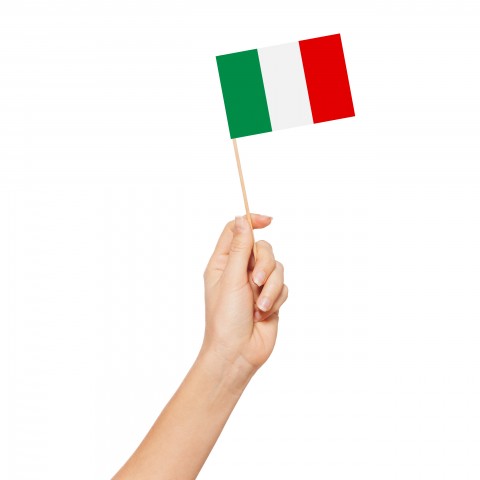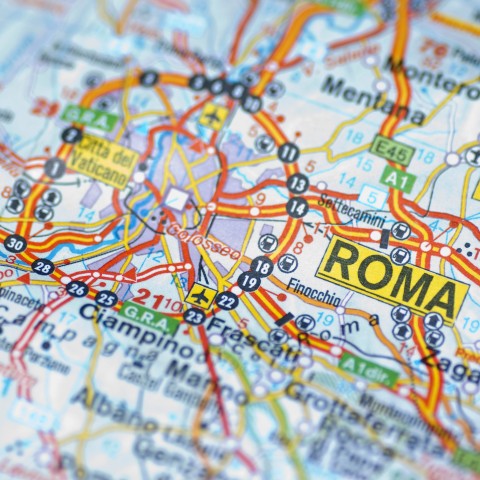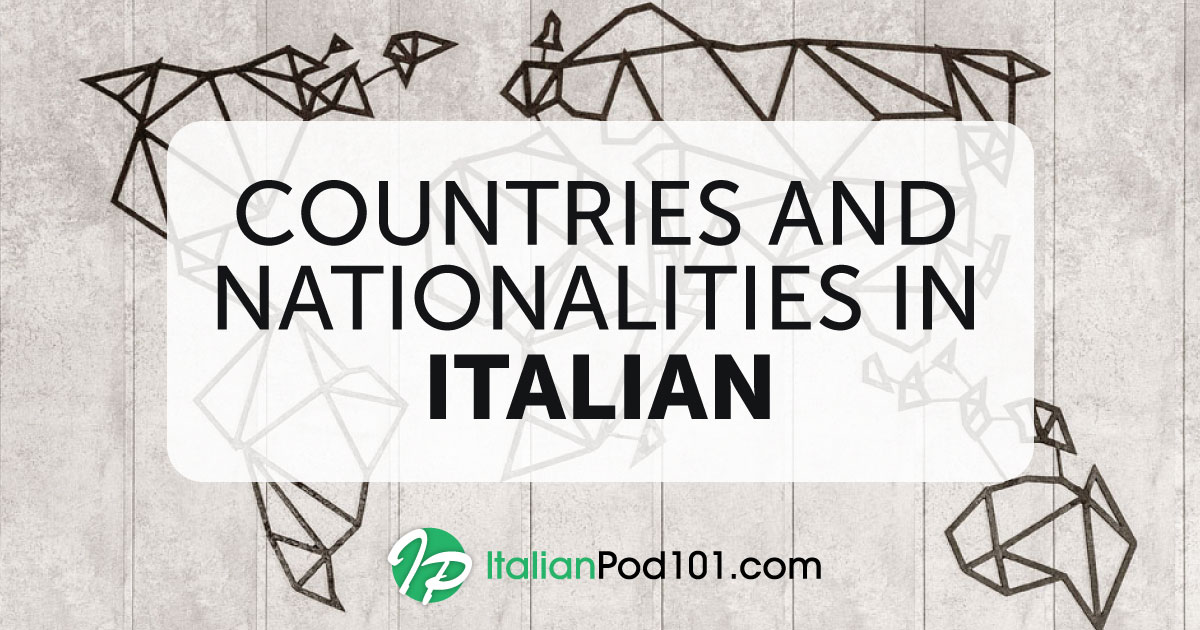Italian prepositions are like almost everything else in the Italian language: hard to understand at the beginning, but poetic and lovely to the ear. Well, with this comprehensive guide to prepositions in Italian by ItalianPod101, you’ll learn Italian prepositions in the blink of an eye.
We’ll cover the basics of Italian prepositions and when to use them, using charts and examples so that understanding Italian prepositions has never been clearer. It’s Italian prepositions made easy!
Table of Contents
- What is a Preposition?
- How to Use Italian Prepositions
- Main Italian Prepositions
- Main Prepositions + Article
- Learn Italian with Ease at ItalianPod101
1. What is a Preposition?
But first, we must start with the basics: the very definition of a preposition.
A preposition is a small word that connects two words or sentences that have a specific relationship to each other.
For example: The cat is in the box. The preposition here doesn’t connect them in a one+one relation—that’s a conjunction (e.g. Angela and Luke are going to meet some friends).
Instead, a preposition adds some information regarding the relationship between the two elements it connects. For example, it tells you that the cat is in the box, not on the box or beside it.
2. How to Use Italian Prepositions
In Italian, there are basically two different kinds of prepositions:
- Main prepositions (preposizioni proprie in Italian)
- Main prepositions + article
Then there are words that can be used as prepositions but also have other uses (preposizioni improprie in Italian), and prepositions made of more than one word. In this article, we’ll talk about the main prepositions (preposizioni proprie) and their combinations with articles.
Yes, we know, grammar is complicated. But we’ll show you how to use prepositions in Italian with the help of some examples, and everything will become much simpler.
3. Main Italian Prepositions
The main prepositions in Italian are: di, a, da, in, con, su, per, tra, fra. Let’s see each one of them in detail.
1- Di
As far as simple prepositions in Italian go, di is by far the most important and versatile preposition of all. It may have a lot of different functions within a sentence. The most important are:
- Specification
- Aspettiamo l’arrivo di Marta.
“We are waiting for Marta’s arrival.”
- Aspettiamo l’arrivo di Marta.
- Naming
- Stiamo entrando nella città di Roma.
“We are now entering the city of Rome.”
- Stiamo entrando nella città di Roma.
- Fault
- Il colpevole di questo crimine è stato trovato.
“The person who’s guilty of this crime has been found.”
- Il colpevole di questo crimine è stato trovato.
- Penalty
- Ho dovuto pagare una multa di 80 euro.
“I had to pay an eighty-euro fine.”
- Ho dovuto pagare una multa di 80 euro.
- Origin
- Sono di Bologna.
“I’m from Bologna.”
- Sono di Bologna.
- Subject
- Vorrei parlarti di Marco.
“I’d like to talk to you about Marco.”
- Vorrei parlarti di Marco.
- Agent
- I tuoi pantaloni sono macchiati di sugo all’arrabbiata.
“Your trousers are stained with arrabbiata sauce.”
- I tuoi pantaloni sono macchiati di sugo all’arrabbiata.
- Material
- Adoro le case di legno.
“I love wood houses.”
- Adoro le case di legno.
- Abundance
- Lucia è sempre così piena di energia.
“Lucia is always so full of energy.”
- Lucia è sempre così piena di energia.
- Limitation
- Il Marocco è un paese povero di acqua.
“Morocco is a country that’s poor in water.”
- Il Marocco è un paese povero di acqua.
- Cause
- Sto tremando di rabbia.
“I’m shaking with rage.”
- Sto tremando di rabbia.
- Partition
- Questa è la piazza più bella di tutte quelle che abbiamo visto.
“Of all the squares we’ve seen, this is the most beautiful.”
- Questa è la piazza più bella di tutte quelle che abbiamo visto.
- Comparison
- Firenze è più piccola di Milano.
“Florence is smaller than Milan.”
- Firenze è più piccola di Milano.
- Quality
- Cerchiamo persone di talento.
“We are looking for talented people.”
- Cerchiamo persone di talento.
- Weight or measure
- Ho comprato un melone di 3 chili.
“I’ve bought a three-kilo melon.”
- Ho comprato un melone di 3 chili.
- Specific time (when)
- La libreria è chiusa di lunedì mattina.
“The bookstore is closed on Monday mornings.”
- La libreria è chiusa di lunedì mattina.
- Continued time
- Ho fatto un viaggio di un mese negli Stati Uniti.
“I took a one-month trip to the United States.”
- Ho fatto un viaggio di un mese negli Stati Uniti.
It can also connect a sentence with a clause. For example:
- Teresa mi ha chiesto di tornare da lei.
“Teresa has asked me to come back to her.” - Ti ringrazio di essere così gentile con me.
“Thank you for being so kind to me.” - Ti ordino di smettere.
“I order you to stop.”
2- A
Another one of the simple Italian prepositions is a, which becomes ad when used before a word that starts with a vowel. It may be used in a sentence for many purposes:
- Indirect object
- Questa canzone è dedicata a mia moglie.
“This song is dedicated to my wife.”
- Questa canzone è dedicata a mia moglie.
- Being in a place
- Stasera voglio stare a casa.
“Tonight I want to stay at home.”
- Stasera voglio stare a casa.
- Specific time (when)
- Comincerò l’università a settembre.
“I’ll start university in September.”
- Comincerò l’università a settembre.
It can also connect a sentence with a clause when the clause is related to a cause or goal:
- Mi sbagliavo a fidarmi di lui.
“I was wrong to trust him.” - Sono venuto a congratularmi con te.
“I’ve come here to congratulate with you.”
3- Da
Da is another Italian preposition with a lot of different functions. In a sentence, the most important are:
- Going from a place
- Sono partito da Roma questa mattina.
“I left Rome this morning.”
- Sono partito da Roma questa mattina.
- Going to someone
- Per favore, torna da me.
“Please, come back to me.”
- Per favore, torna da me.
- Being at someone’s place
- Stasera vado a dormire da Michela.
“Tonight I’m going to sleep at Michela’s place.”
- Stasera vado a dormire da Michela.
- Agent and cause
- Marco è stato aiutato dai suoi amici.
“Marco has been helped by his friends.”
- Marco è stato aiutato dai suoi amici.
- Separation
- Luca è molto diverso da suo fratello.
“Luca is very different from his brother.”
- Luca è molto diverso da suo fratello.
- Specific time (from when)
- Il corso ricomincerà da lunedì.
“The course will start again on Monday.”
- Il corso ricomincerà da lunedì.
- Continued time (for how long)
- Danila è a casa da due ore.
“Danila has been home for two hours.”
- Danila è a casa da due ore.
- Price
- Il mio capo ha un’auto da 80.000 euro.
“My boss owns a 80.000-euro car.”
- Il mio capo ha un’auto da 80.000 euro.
- Manner
- Si è comportato da stupido.
“He acted stupid.”
- Si è comportato da stupido.
- Purpose
- I tuoi occhiali da sole sono davvero belli.
“Your sunglasses are really nice.”
- I tuoi occhiali da sole sono davvero belli.
It can also connect a sentence to a clause related to a goal or consequence. For example:
- Ho riso tanto da piangere.
“I laughed so much that I cried.” - Mi resta solo un episodio da vedere.
“I just have one episode left to see.”
4- In
This preposition is mostly used for the following functions:
- Being in a place:
- L’ufficio è in via San Felice.
“The office is on San Felice Street.”
- L’ufficio è in via San Felice.
- Period of time:
- Ho speso tutto il mio stipendio in 5 giorni.
“I spent all my salary in five days.”
- Ho speso tutto il mio stipendio in 5 giorni.
5- Con
Con is basically the same as the English preposition “with”:
- Aspetta, vengo con te.
“Wait, I’ll go with you.” - Con questo caldo, bisogna bere molta acqua.
“With this heat, you have to drink a lot of water.”
6- Su
Su is used mainly for:
- Being on something
- Il gatto è salito su un albero.
“The cat has climbed on a tree.”
- Il gatto è salito su un albero.
- Manner
- Prepariamo torte su richiesta.
“We bake cakes upon request.”
- Prepariamo torte su richiesta.
- Subject
- Ho scritto un libro sulla mia esperienza.
“I’ve written a book about my experience.”
- Ho scritto un libro sulla mia esperienza.
- Fraction
- Quasi una donna italiana su due non lavora.
“Almost one in two Italian women doesn’t work.”
- Quasi una donna italiana su due non lavora.
7- Per
In most sentences, per can be translated to the English preposition “for.” For example:
- Oggi devo comprare un regalo per mia figlia.
“Today I have to buy a present for my daughter.” - Per un bel concerto, sono capace di fare centinaia di chilometri.
“I can travel hundreds of kilometers for a good concert.” - Il vestito sarà pronto per venerdì.
“The dress will be ready on Friday.” - Giulia parte per New York domani mattina.
“Giulia is leaving for New York tomorrow morning.”
But it’s also used for clauses related to a cause or goal:
- Sono partito un’ora fa per arrivare puntuale.
“I left an hour ago to arrive on time.” - Per fare carriera il mio collega farebbe qualsiasi cosa.
“To move up in his career, my colleague would do anything.”
8- Tra and fra
Tra and fra are identical in meaning and function. Their main uses in a sentence are:
- Going through a place
- Siamo passati tra le due case.
“We passed between the two houses.”
- Siamo passati tra le due case.
- Distance (in space and time)
- Arriveremo tra due ore.
“We’ll arrive in two hours.”
- Arriveremo tra due ore.
- Company
- Amo passare le vacanze fra amici.
“I love to spend the holidays among friends.”
- Amo passare le vacanze fra amici.
- Continued time
- Tra il 2015 e il 2018 ho abitato a Milano.
“From 2015 to 2018 I lived in Milan.”
- Tra il 2015 e il 2018 ho abitato a Milano.
4. Main Prepositions + Article
Italian prepositions and articles combine to form single words. But it’s important to note that Italian articles and prepositions combine only when the article is definite. That’s to say, only when it’s il, la, lo, l’, le, i, or gli, and when the preposition is di, a, da, in, and su (con and per only in ancient Italian). Everything will be clearer with this Italian prepositions + articles chart:
| Il | La | L’ | Lo | I | Gli | Le | |
|---|---|---|---|---|---|---|---|
| Di | Del | Della | Dell’ | Dello | Dei | Degli | Delle |
| A | Al | Alla | All’ | Allo | Ai | Agli | Alle |
| Da | Dal | Dalla | Dall’ | Dallo | Dai | Dagli | Dalle |
| In | Nel | Nella | Nell’ | Nello | Nei | Negli | Nelle |
| Su | Sul | Sulla | Sull’ | Sullo | Sui | Sugli | Sulle |
Here are some examples of Italian prepositions and articles:
- Hai portato la macchina dal meccanico?
“Have you brought the car to the mechanic?” - Ho lasciato l’agenda sulla scrivania, al lavoro.
“I’ve left my diary on the desk, at work.” - Attento, è pericoloso tuffarsi dagli scogli!
“Careful, it is dangerous to dive from the rocks!”
5. Learn Italian with Ease at ItalianPod101
Grammar can be harsh and complicated, but it’s easy to learn when you can follow the lessons whenever you want and study in an entertaining, interactive environment. That’s ItalianPod101.
Here on our site, you’ll find comprehensive guides like this one that’ll help you become a master of the Italian language, with tons of examples and tips. Download our apps or enjoy our video lessons from your PC, and whenever you have a doubt or just want to chat, you can find fellow students on our forum. Don’t be shy!
Before you go, let us know in the comments how you feel about Italian prepositions. More confident, or do you still need some Italian prepositions help? We look forward to hearing from you, and will help out the best we can!
















